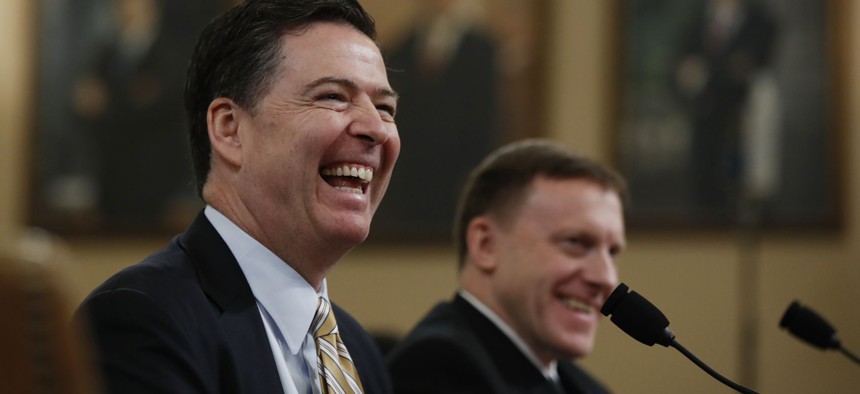Secretaries of State Put Exclamation Point on Comey’s Intel Testimony

FBI Director James Comey, left, joined by National Security Agency Director Michael Rogers, right, react to a lawmaker's remark on Capitol Hill in Washington, Monday, March 20, 2017, as they testified before the House Intelligence Committee. Manuel Balce Ceneta / AP Photo

Connecting state and local government leaders
On the heels of Russia testimony on Capitol Hill, the National Association of Secretaries of State released a cybersecurity fact sheet on what did—and didn’t happen—during last year’s elections.
WASHINGTON — In an unexpected bookend to the testimony presented by FBI Director James Comey and National Security Agency Director Michael Rogers before the U.S. House Intelligence Committee on Monday, the National Association of Secretaries of State released a fact sheet based on “unclassified documentation and evidence available” to the organization. The piece declares that the “November 2016 election was NOT HACKED” (emphasis theirs).
The dissonance over whether the election was “hacked” has been a point of political contention as much as a battle of words. Some point to the fact that it is the conclusion of the intelligence agencies that there was no manipulation of the vote as a sign that the election results were sound, while others point to the hacking of the Democratic National Committee and Democratic political operatives, along with the strategic release of information obtained through these hacks, as effectively “hacking” the election process. With Monday's confirmation of an ongoing investigation into potential coordination between Russia and President Donald Trump's campaign, the political and linguistic battles around the issue are not likely to end anytime soon.
For NASS, whose members serve as the chief state election official in 40 states, the blurring of lines on this issue is a personal affront to their efforts to deliver secure, sound election results.
The association accurately states in their report that “No credible evidence of hacking, including attempted hacking of voting machines or vote counting, was ever presented or discovered in any state, including during recount efforts that took place after the election.” It did conclude that there were intrusions into voter databases, but these breaches resulted in no manipulation and have no effect on the vote tally.
Comey concurred with this in his testimony today, stating, “We saw efforts to penetrate voter registration databases, state Boards of Elections, at that level. We saw no efforts aimed at the vote itself.”
House Intelligence Committee Chairman Devin Nunes, a Republican from California, asked both Rogers and Comey if either had “evidence that suggests ... any votes were changed,” to which both replied they did not.
The NASS report also laid out that 33 states and 36 county jurisdictions had taken advantage of the agency’s voluntary assistance and services by Election Day on Nov. 8, 2016. It also said that while the “highly-decentralized, low-connectivity elections process” provided natural protections against “large-scale cyberattacks,” it asserted states are doing more in preparation for the next election.
Comey also touched on this matter in his testimony, stating: “We … as a government, supplied information to all the states so they could equip themselves to make sure there was no successful effort to affect the vote and there was none.”
A significant portion of Monday’s hearing explained that undermining U.S. elections did not need direct manipulation of the vote for Russia to achieve its goals. Comey said the Russians were acting “loudly.”
“Their loudness, in a way, would be counting on us to amplify it by telling the American people what we saw and freaking people out about how the Russians might be undermining our elections successfully,” Comey explained.
The probing of U.S. election systems, state voter databases and board of elections, were enough to have an effect. It is the equivalent of parking a Russian ship off the Delaware coast—or perhaps Sputnik for a previous generation: a portrayal of power that makes us wonder what “they” are up to.
“I'll just say as initial matter they'll be back,” Comey explained. “One of the lessons they may draw from this is that they were successful because they introduced chaos and division and discord and sewed doubt about the nature of this amazing country of ours and our democratic process.”
Rogers had a similarly sobering assessment. “I fully expect them to continue this … level of activity,” he explained. “Our sense is that they have come to the conclusion that it generated a positive outcome for them in the sense that calling into question the democratic process for example is one element of the strategy.”
NASS noted in their report that they had set up an Election Cybersecurity Task Force that “will advance collaboration on the unique priorities and challenges that exist regarding election cybersecurity.” Based on the evidence thus far, it may require a focus on rapid response communications as much as cybersecurity defenses.
Mitch Herckis is Senior Program Director for Government Executive’s Route Fifty and is based in Washington, D.C.

NEXT STORY: Boston puts open-data quality first





